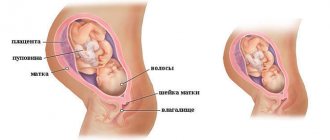Fetal development at 25 weeks of gestation
At week 25, the baby is already quite well developed, and his appearance is becoming more and more similar to the appearance of a newborn. However, he is not yet ready for independent life outside his mother’s body.
Main characteristics of fetal development at 25 weeks of pregnancy:
- The weight of the unborn child is about 0.7 kg, and the height can reach up to 34-35 cm.
- Alveoli are forming in the lungs, but there is no surfactant in them yet. It is necessary to prevent the walls of the alveoli from sticking together during breathing.
- The auricle continues to form. By the way, the degree of its maturity allows us to assess the level of development of the child in the event of his premature birth. At the same time, the inner ear matures, which provides orientation and position of the body in space.
- If previously the liver and spleen were responsible for the function of hematopoiesis, now the bone marrow takes over.
- The child reacts sensitively to the mother’s condition and notices all her mood swings. If a woman is in pain, the baby winces and frowns, and when the mother is happy, the child smiles.
- During intrauterine development, the fetus cannot smell because it is in the amniotic fluid. However, a child is born with an excellent sense of smell, which by the 25th week of pregnancy is already fully formed.
- Bones get stronger every day, muscles become stronger. A woman can notice this by how much more noticeable the tremors in her stomach have become.
- The boy's testicles should already descend into the scrotum, and in girls the vagina is formed at this time.
- The baby's weight is actively increasing due to the fact that adipose tissue begins to appear. It is thanks to her that the baby acquires rounded cheeks and subcutaneous folds. However, at week 25, the fetus still has very little subcutaneous fat.
- The unborn child is already trying to coordinate his actions. He can play with the umbilical cord, cover his face with his palms, and suck a finger. This can be observed during an ultrasound examination if it is scheduled for the 25th week of pregnancy.
Problems of the 25th week of pregnancy
Problems of the 25th week of pregnancy
At week 25, most women continue to have a relatively calm period of pregnancy. But you shouldn’t relax and forget to control your well-being. During this period, some problems may arise that the expectant mother should remember.
Preeclampsia
Most often, gestosis (late toxicosis) manifests itself in the last weeks of pregnancy. This is a pathological, potentially fatal condition that is extremely undesirable for any pregnant woman. Late toxicosis does not just appear out of nowhere; it is the result of processes that occur in a woman’s body throughout the entire period of bearing a baby. The danger of gestosis lies in its consequences, of which there can be many: failure of internal organs or disturbances in their functioning, premature birth, death.
At the 25th week of pregnancy, a woman may experience symptoms indicating the likelihood of developing preeclampsia. They are called harbingers of late toxicosis. The sooner a gynecologist identifies a pregnant woman who is at risk and organizes a search for the causes of incipient gestosis, the higher the likelihood of avoiding or reducing the manifestation of this unfavorable condition.
Early identification of women at risk is facilitated not only by the tests taken at each appointment, but also by the pregnant woman’s frank stories about the unpleasant sensations that have arisen. It is recommended to immediately inform the gynecologist if the expectant mother notices:
- the appearance of swelling of the face, arms, legs or excessive weight gain for no apparent reason;
- surges in blood pressure, accompanied by headache, heaviness in the back of the head;
- rapid decrease in vision;
- problems with urination: pain or cramping;
- shooting pains on the sides of the lumbar back.
The presence of these symptoms does not always mean that there will definitely be problems in the last weeks of pregnancy. They allow you to take timely measures to identify possible causes of pathologies, make adjustments to your diet, and prescribe treatment to avoid unpleasant consequences.
Premature birth
The onset of labor at the 25th week is a fairly rare event, usually caused by external factors or existing pathology of pregnancy. The survival rate of children born with an extremely low birth weight (less than 1 kg) is 50/50, but even under favorable conditions health problems and a long recovery process cannot be avoided. The expectant mother should strive to extend the gestation period as much as possible, preferably until full maturity (38-40 weeks).
When identifying the beginning of the process of premature birth, it is important to urgently seek medical help. In some cases, this can be stopped or slowed down, but if this is not possible, then the baby must be born in a hospital where there are all the conditions for his care.
It is necessary to urgently seek medical help if a woman notices the appearance of:
- pain in the abdomen: severe, similar to menstrual pain;
- cramping pain;
- severe or moderate pain in the groin, with a feeling of squeezing in the hips and pelvis;
- diarrhea or intestinal cramps;
- increased back pain, dull pain that gradually increases;
- red or brown discharge in significantly greater quantities than usual.
The sooner a woman enters the maternity hospital with premature birth, the greater the chance of stopping the process or delaying it.
At the 25th week of pregnancy, a woman becomes increasingly aware of her situation and continues to build a close connection with her baby. Now communication becomes two-way, and gradually the expectant mother begins to understand which pushes and movements mean approval from the baby, and which ones express protest. This communication adds strength and makes it easier to go through the unpleasant sensations and difficulties of pregnancy.
Most mothers at this stage say that despite the ailments that appear, it is worth it. After all, what could be more important than providing your tiny son or daughter with everything they need? And the mother is ready to endure anything (even the painful indignation of the little commander), the main thing is that the baby is born healthy and on time.
If you liked the article, please share a link to it
Ultrasound at 25 weeks of pregnancy
The second planned ultrasound is usually performed earlier - at 20-24 weeks of pregnancy. However, it often happens that the timing of the study may be slightly shifted, and then it will be done at 25 weeks.
During the procedure, the doctor will assess the development of the fetus, its condition and the correspondence of physiological characteristics to the actual period. This will eliminate various pregnancy defects.
The average indicators of normal fetal parameters at week 25 are as follows:
- Chest – 63.1 mm;
- Belly – 64.2 mm;
- Head – 62.3 mm;
- Heart rate – 140-150 beats per minute.
Most likely, during the study it will be possible to determine the sex of the child. Although sometimes children “hide”, and you can never be 100% sure of the data received.
Also during the ultrasound, the doctor assesses the condition of the woman herself. First of all, he is interested in the thickness of the placenta, which should now be 26.22 mm, and its location. When the doctor says that the placenta is low, there is no need to worry. Most likely, right now it will begin to rise.
The doctor also evaluates the quantity and quality of amniotic fluid, the size and location of the uterus. If everything is in order, then the next scheduled ultrasound will be the last - prenatal.
Discharge from the genital tract
Discharge at week 25 is light, milky, moderately liquid, without a strong unpleasant odor. Any changes in color, smell, consistency and amount of discharge should be a reason to seek help for timely diagnosis and treatment of the pathology. The doctor will carry out the necessary studies, eliminate the threat of interruption, and prescribe anti-inflammatory therapy. If there is a threat of interruption, he will refer you to the hospital
Abundant transparent discharge, constantly creating the effect of wet panties, may indicate rupture of the membranes, which can lead to infection of the fetus and termination of pregnancy.
After all, there is less and less time left before the baby arrives, and his activity is increasing every day. Now you can even highlight the periods of sleep and activity of the child. Moreover, like an adult, an unborn baby already has a phase of REM sleep and slow sleep.
The only thing that has not yet been clarified by science is whether babies dream in the womb. But it has already been proven that the child still experiences some emotions.
At this stage of pregnancy, the baby continues to actively strengthen the musculoskeletal system. This is the time when the baby’s heart has been beating for several weeks and this can be clearly heard by doctors using a stethoscope. It is worth noting that even without special devices you can hear the heartbeat of an unborn baby. If the husband puts his ear to mom’s tummy and there is silence in the room, then you can hear the first signs of the baby’s life.
At the 25th week of pregnancy, the sex of the unborn baby is already definitively known, since from the 25th week the testicles begin to descend into the scrotum, and if it is a girl, then her vagina begins to form. His fingers are getting better at clenching fists, and now he is determining for himself which hand is most comfortable for him to do something with. In other words, it is determined who the baby will be: right-handed or left-handed. And if you are born left-handed, this does not mean that your mother taught him to hold a spoon incorrectly. Doctors have proven that this is a congenital feature and it will be very difficult to retrain him.
Right now an imprint is being formed on the fingers, and the baby himself can already play not only with his umbilical cord, but also with his leg.
The size and weight of the fetus at the 25th week of pregnancy has increased significantly since last week and is already 22 cm and weighing 700 grams.
What happens to the uterus?
To really estimate the size of the uterus at 25 weeks of pregnancy, you can imagine a soccer ball. Its upper part, or the so-called “fundus of the uterus,” rises above the pubis by an average of 26 cm. If the uterus is lower, this may indicate placental insufficiency, and if higher, then polyhydramnios or a multiple pregnancy.
Although the size of the uterus is already quite large, it will continue to grow. Also, a woman may periodically feel its contractions. Sometimes they are accompanied by mild pain. Normally, such training contractions are short-lived or sporadic and do not require medical assistance. However, if the pain continues to intensify, then you should definitely go to the hospital.
Pain
In addition to the abdominal pain described, this is mainly pain in the back, lower back, sacrum, pelvic region, spine and under weight, possibly in the legs. These pains can be alleviated in many ways if you follow simple rules:
- do not sit cross-legged or on a chair without a back;
- try not to sit for long periods on hard surfaces;
- learn to get out of bed and squat correctly;
- Don’t be on your feet for a long time (don’t walk or stand a lot);
- do not wear high-heeled shoes;
- use a bandage and compression stockings;
- do gymnastics for pregnant women.
You will have to endure pain in the hypochondrium, because the baby is growing faster and faster, and his legs are becoming stronger - so he pesters you with his blows. Try changing your position if the baby starts kicking.
25 week pregnancy video
25 week pregnancy photo
Do not ignore pain in the anus. They may indicate developing hemorrhoids and are accompanied by itching, burning, and bleeding during bowel movements. If pain is felt during bowel movements, and a streak of blood is visible on the stool, then most likely it is from an anal fissure (the first thing you need to do is get rid of constipation).
If headaches often begin to bother you, then monitor the following symptoms: swelling of the hands and face, darkening of the eyes, whether the weight gain exceeds the norm, and whether the stomach hurts. The combination of these signs may indicate incipient preeclampsia, although it usually develops later in pregnant women.
Abdominal pain can also occur when there is a threat of premature birth or placental abruption, if it is accompanied by increased tone of the uterus (it becomes stone) and spotting.
What's happening to the stomach?
Now the belly continues to grow. Every week it increases in size by about 10 mm. Most often, from the 25th week of pregnancy, women note that the rate of abdominal growth has become faster. This is actually true, because the baby is actively gaining weight and height.
Since the center of gravity shifts to the stomach, the gait of the expectant mother changes, and her posture may worsen.
As the uterus grows, pressure on the internal organs increases:
- Pressure on the intestines can lead to constipation;
- Pressure on the stomach leads to heartburn and belching;
- Pressure on the bladder causes increased urination;
- Pressure on the diaphragm and lungs leads to shortness of breath and difficulty breathing.
To get rid of digestive problems, you need to eat right, eating beets, fermented milk drinks, and prunes. To prevent constipation, you need to move as much as possible, and even better, perform special physical exercises for expectant mothers.
If your increased belly size is already affecting your posture and causing back problems, then you should consult a specialist about wearing a prenatal bandage.
Causes of pain at 25 weeks
In addition to the fact that abdominal pain can occur due to training contractions, they can also be caused by increased stress on the back and spine.
To avoid discomfort, the following recommendations must be followed:
- You need to sit on chairs that have a back.
- Legs cannot be thrown over each other.
- You need to get out of bed carefully. First you need to roll over onto your side, then raise your upper body, and then put your feet on the floor and stand up.
- You need to spend as little time as possible in a static position - sitting and standing. But walking for a long time is also not recommended.
- High-heeled shoes should be avoided.
- To prevent varicose veins in your legs, you should wear compression stockings.
- Gymnastics for pregnant women is a very useful activity that allows you to get rid of many problems.
Sometimes a woman may experience pain in the hypochondrium area, which is triggered by the movements of the baby. There's nothing you can do about it, you'll have to be patient. If the baby begins to kick very hard, then you should try to change the position of the body - perhaps this will calm him down.
Exacerbation of hemorrhoids or anal fissure is indicated by pain in the anus. At the same time, symptoms such as itching and burning occur, and blood may appear during bowel movements. Hemorrhoids definitely need to be treated, and you should start with getting rid of constipation.
Headaches themselves can be caused by overwork and hormonal changes in the body. To get rid of them, you need to rest as much as possible and spend time outdoors. If your head hurts too often and severely, then you need to pay attention to whether swelling occurs against the background of pain, whether your stomach hurts, or whether there is too much weight gain. The combination of these signs may indicate preeclampsia, a serious complication of pregnancy that requires hospitalization.
Any pain in the abdomen should not be ignored, as it may signal the onset of premature labor or placental abruption, which requires calling an ambulance.
How can an expectant mother relax?
Mom's rest, as a rule, is distributed between two poles: a state of physical and intellectual idleness, on the one hand, and active, enjoyable pastime, on the other. Between them, moderate physical activity in the pool or in the fitness club, walks in the fresh air and meeting with friends, meditation and going to the theater, reading books and traveling to the sea.
The rule “good/healthy/comfortable for mom” is also relevant for relaxation. The pleasure hormones coming from the mother, the expansion of the repertoire of impressions, new sensations from traveling by train, flying on an airplane, sailing on a ship, boat or motorboat, the sounds of the sea surf, the rustling of oak trees, etc. are useful for the Baby. But the most important thing:
- During rest, the Baby will have the opportunity to communicate with you much more often than in the daily routine - after all, you will definitely find time to talk to him, stroke him (even through the wall of his stomach), sing songs to him, rhythmically patting his stomach , talk about what you see and feel, play, conduct special classes, etc. Both before and after birth, the baby dreams that his mother will belong entirely to him. It is unlikely that this is possible twenty-four hours a day (physically this is true, but emotionally it is not), but paying attention to the Baby several times during the day (from five to thirty minutes) is quite possible for you. Mom’s attention and communication with her is a powerful factor in a child’s development: your Baby is sensitive to moments when your energy is directed exclusively at him. He rejoices in his own way: he actively reacts with movements when you address him, sing songs or read poetry, swims up to your palm on his stomach or rests his leg, fist on it, etc. Communication with you contributes to the overall development of your baby, emotional well-being affects not only his active growth, but also mental health - the key to the fact that he will develop well attention, memory, thinking, speech and all abilities inherent in nature;
- thanks to active rest and fresh air, oxygen access to the Baby’s growing body increases, metabolic processes intensify, his stomach and intestines function better, brain activity is more active, the baby’s appetite and mood improves;
- The baby gets great pleasure in a state of “double weightlessness” - when the mother swims or at least is just in the water. The atmospheric pressure on the walls of the abdomen in water is significantly reduced, and the Baby floats in his own space or, if your baby is already 6 months or more, feels greater freedom to move his arms and legs. Of course, we are not talking about staying in a bath, but at least in a pool, or a river, or in the sea;
- Immersion in the world of musical sounds is also useful for the Baby, as it develops his sense of rhythm, ear for music, and promotes the development of musical abilities. This effect is even stronger if you not only listen to music, but also move to the beat of the melody. In the latter case, the development of kinesthetic sensations and the vestibular apparatus as a whole occurs - in the future this will be useful for developing a sense of balance and the ability to crawl, stand and walk, and even later - to dance, tumble, etc.;
- There is an assumption that the mother’s contemplation of the beauty of nature, paintings by famous artists, works of ancient and modern architecture influences the development of the Baby’s sensitivity to beauty and the development of artistic taste. And your baby certainly shares with you, starting from the second trimester, all the emotional experiences associated with joining the world culture. And this is certainly useful for him.
Discharge at 25 weeks of pregnancy
Allocations during this period should remain without any changes. Their color should be whitish, or they can be completely transparent. The discharge should not have an unpleasant odor or be accompanied by discomfort.
Sometimes the discharge may become larger; in this case, you need to make sure that the reason for the increase in its volume is not leakage of amniotic fluid. They may come out in small portions, but unlike normal discharge, amniotic fluid is slightly yellowish in color. Leakage of amniotic fluid is dangerous, so the woman must be hospitalized.
When cheesy clots appear in the discharge and a sour smell begins to emanate from them, this indicates the development of thrush. Other signs of candidiasis are redness of the skin of the external genitalia, a burning sensation and severe itching. Thrush must be treated before labor begins so that the baby is not infected while passing through the birth canal. To prevent the development of thrush in the future, you must follow a diet and avoid eating baked goods and confectionery products.
The risk that a woman will develop an infectious disease of the reproductive organs increases when she changes sexual partners. Therefore, if the discharge becomes sallow, green or yellow in color, you should seek medical help as soon as possible. The point is that many bacteria can pose a danger to the fetus, as they are able to penetrate the placental barrier.
If, after an examination by a gynecologist or after intimacy, a woman discovers a little blood in the discharge, this should not frighten her. However, it is still necessary to consult a doctor again, since it is possible that the pregnant woman is developing cervical erosion. The threat of miscarriage is indicated by excessive bleeding, which is accompanied by cramping pain in the abdomen and lower back. In this case, the ambulance team should be called without delay.
Possible problems
Pain at the 25th obstetric week of pregnancy
A woman may experience pain from time to time from the moment she conceives a child. The 25th week of pregnancy is no exception. It is very important not to endure or wait out the pain, because this can lead to miscarriage. It is better to seek medical help to solve the problem and understand its cause than to put it off and then bite yourself.
Pain can occur in the abdomen, lower back, anus, sacrum, legs, and head. To exclude this, you must:
- exercise;
- wear comfortable shoes without heels;
- do not sit with your legs crossed, do not lie on your back;
- do not stay in a vertical position for a long time;
- proper rest;
- wear a bandage belt and compression garments.
Fever and colds
It’s easy to catch a cold during pregnancy, because a woman’s immunity is weakened during this period. Anyone with a viral infection can become a source of infection. The expectant mother should ensure that treatment is started as soon as possible and a doctor must be involved in this. Only he can prescribe drugs and methods that will not harm the child.
There is no need to lower the temperature to within 37.5 degrees. In the second and third trimester, it is possible that it may rise to this level, especially in the late afternoon, and this is considered normal. It is necessary to control the temperature, because extreme heat can negatively affect the baby’s health. Compresses, rubbing with cool water, and drinking plenty of fluids will help alleviate the condition. Cough, runny nose and sore throat should be treated with herbal infusions and inhalations. In severe cases, the doctor will prescribe medications that will not cause much harm to the fetus.
To avoid getting sick during epidemics, you should adhere to the following recommendations:
- Avoid hypothermia of the body, especially the legs and lower back.
- Do not visit public places. But if there is an urgent need, use a mask.
- Ventilate the room more often.
- Use safe ointments to prevent colds. You can also use traditional medicine. Black radish juice is especially effective.
Discharge at 25 weeks of pregnancy
A woman at 25 weeks should be alert to any changes in discharge. Normally, they should be whitish in color and have a uniform consistency without a pungent odor. If you find something different on your underwear, consult a doctor immediately. During this period, amniotic fluid may leak, which has a yellowish tint. An examination by a doctor should help identify the cause. Leakage is dangerous for the life of the fetus, so the woman is hospitalized and treated in a hospital.
A curdled discharge with a sour smell is thrush. Having discovered them, it is necessary to obtain a doctor’s prescription and begin treatment as quickly as possible.
The infection does not pose a mortal danger to the child, but in advanced forms it can seriously affect his health.
Feel
The usual way of life will now have to be slightly disrupted, because significant changes are taking place in the woman’s body. For example, the problem of blood clots and varicose veins may become acute. To minimize all possible risks, you need to rest as much as possible, placing a bolster or small pillow under your feet. To prevent varicose veins, doctors recommend wearing compression stockings, and sometimes it is necessary to prescribe special medications to strengthen blood vessels and prevent thrombosis. You should definitely continue to walk, but you shouldn't walk for too long.
During active movements of the fetus, a woman may experience discomfort. When the baby turns over, you can see how the skin on the expectant mother’s belly tightens.
Already, doctors do not recommend sleeping on your back. The safest position a woman should take while sleeping is on her left side. And the expectant mother herself will definitely notice that the child becomes uncomfortable in her stomach if she lies down “wrongly.” Most often this is expressed in increased activity of the baby.
Discharge
Normally, discharge at the 25th week of pregnancy is transparent or whitish, liquid, sometimes copious, which can alarm a woman. They should not emit any strong odors or cause any discomfort. But sometimes it happens that water begins to leak in the second half of pregnancy. You need to clarify this issue with your gynecologist and make sure that everything is fine. Water leakage is dangerous, so in this case the woman is hospitalized. Water may leak in small portions, drop by drop, or pour out abruptly, wetting the laundry. Amniotic fluid has a yellowish color.
If there is a large amount of discharge, it has acquired a sour smell, has become cheesy and causes itching, burning and swelling of the genitals, then, obviously, your thrush has worsened. It must be treated before birth, since during the passage of the birth canal the child will also be infected. In the future, do not wear synthetic underwear and limit your consumption of flour and sweets.
The risk of developing other sexually transmitted infections remains high. You should be alerted to any changes in normal discharge. Consult your doctor for a smear if you have yellow, green, purulent, sallow, or brown discharge. A change in their consistency, appearance, smell and the appearance of additional alarming signs (discomfort, painful urination, increased body temperature, chills) should be a reason for an unscheduled visit to the gynecologist.
Do not be alarmed by spotting or spotting that appears after sexual intercourse or a gynecological examination and is not accompanied by abdominal pain. They, of course, are not the norm, but they do not indicate a threat of termination of pregnancy. Most likely, this is cervical erosion.
Intimate life
Despite the increased size of the belly, it should not be an obstacle for a couple to have sex. Sexual activity at 25 weeks of pregnancy will be prohibited only if such recommendations are given by a doctor.
However, even if there are no medical prohibitions, spouses need to exercise some caution. It is important that during intimacy there is no pressure on the stomach; you should also avoid deep penetrations and sudden movements.
A child cannot be harmed during sex; he is reliably protected in the womb. As for the woman herself, she can experience a new range of sensations and emotions, because during pregnancy, blood flow to the genitals increases several times. This allows you to make the orgasm much brighter.
Lifestyle
At week 25, if you really want to, you can still visit the steam room. Bathing during pregnancy is, of course, a controversial issue. Both in the early and late stages you should not steam, as this can cause miscarriage and premature birth. But in the middle of pregnancy, subject to all precautions and hygiene rules, visiting a steam room or sauna helps improve the health of mother and child. It would also be useful to remember that in Ancient Rus', women not only took steam baths, but also gave birth. However, if you feel unwell, the pregnancy is accompanied by complications and there is a threat of its termination, you should avoid going to the bathhouse at any stage of the “interesting situation”.
What tests will be required at 25 weeks of pregnancy?
The woman still visits the gynecologist once a month. During a routine examination, the doctor gives directions for standard tests - a general urine and blood test, a blood test for sugar, coagulability and a hemostasiogram. If a woman recently took all these tests, and they turned out to be normal, then the doctor is unlikely to recommend taking the tests again.
It is possible that a woman at 25 weeks of pregnancy will show signs of iron deficiency anemia, including dizziness, increased weakness, increased heart rate, dark circles before the eyes, etc. In this case, you will need to donate blood to determine your hemoglobin level and undergo appropriate treatment.
Analyzes
Now you should visit your gynecologist once every 4 weeks. Do not skip scheduled examinations and do not neglect the doctor’s orders for tests - general blood test, urine test, glucose test, blood coagulation test, hemostasiogram. They will help monitor the course of pregnancy and fetal development and promptly identify possible abnormalities and disorders.
If you have recently had tests and your pregnancy is progressing well, then at week 25 you may be able to take a break from visiting clinics and laboratories. But according to indications, the gynecologist may refer you for additional studies. This, for example, could be tests to determine the level of hormones, in particular hCG and progesterone.
Now you should be wary of developing anemia, so monitoring your hemoglobin level is also very important. A lack of iron in the body can be indicated by dizziness, weakness, pale skin, increased heart rate during physical activity, and darkening of the eyes. If you observe these signs in yourself, then you should take a blood test without waiting for your next trip to the doctor.
Principles of proper nutrition
In order for a child to develop and grow properly, he needs nutrients. The lack of even one element can negatively affect the health of the baby. Therefore, a woman’s diet should be varied.
It is important that the menu includes fresh fruits and vegetables, meat or fish, and cereals every day. This will saturate the body with useful microelements and vitamins, and will also make it possible to get rid of many digestive problems, such as constipation and heartburn. If you have difficulty passing stool, you should definitely include boiled beets, prunes, kefir and other products that have a laxative effect in your menu.
You need to eat food in small portions, but often. You can sit down at the table every 2-3 hours, since you cannot fast during pregnancy. However, you should also not lean too heavily on high-calorie foods, since the extra pounds will come very quickly, but getting rid of them will be problematic. Therefore, fatty, fried, smoked, flour, sweet and spicy foods should be restricted.
As you know, iron deficiency anemia is a real scourge of pregnant women. To prevent its development, you must include liver (beef, chicken), buckwheat, oatmeal, legumes, and bran in your menu.
It is equally important to drink enough water. You can replace it with fruit drinks and compotes, but you should be careful with herbal infusions.
Answers to popular questions
- I had an ultrasound at 25 weeks of pregnancy, according to the results, everything was fine with the baby, but it seemed to me that he was moving very little. How often should this happen?
Now a woman should experience at least 3 baby movements in 60 minutes. If their number is less, then you need to inform your doctor.
- Towards the end of the 25th week of pregnancy, I began to experience dizziness, and I also began to get more tired. This is fine?
Mild dizziness at 25 weeks of pregnancy is a common occurrence. For example, they can occur after a long night's rest or a sudden rise from a place, as well as when changing body position. Frequent and intense dizziness requires medical consultation, as it indicates a vascular or nervous pathology.
Author of the article:
Lapikova Valentina Vladimirovna | Gynecologist, reproductive specialist
Education: Diploma in Obstetrics and Gynecology received from the Russian State Medical University of the Federal Agency for Health and Social Development (2010). In 2013, she completed her postgraduate studies at NIMU named after. N.I. Pirogova.
Our authors









